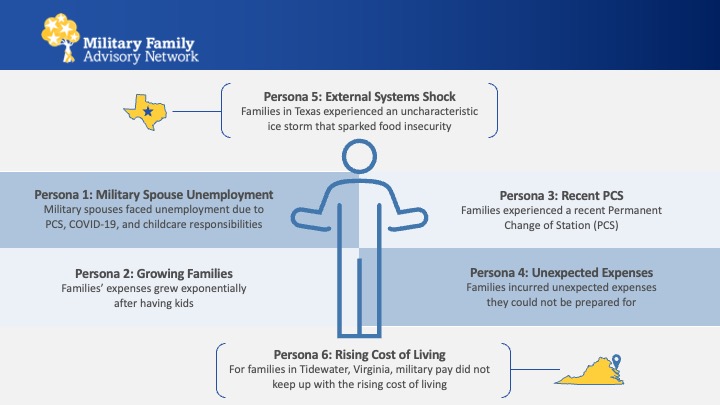Learning from Military and Veteran Family Experiences to Find Scalable Solutions
May 11, 2023On May 7, 2023, MFAN presented at the National Anti-Hunger Policy Conference, hosted by Feeding America and the Food Research & Action Center, and in cooperation with the National CACFP Forum. The conference provides a platform for education, innovation, and collaboration to address the issue of food insecurity.
On the panel, “Combating Military Hunger: Learning from Military and Veteran Family Experiences to Find Scalable Solutions,” our team highlighted MFAN’s unique and effective process that pairs research with a peer network and programmatic action. Presenters included:
- Dr. Gabby L’Esperance – Director of Insights
- Delia Johnson – Vice President of Operations
- Dr. Shanna Smith – Associate Director of Research

Learning Objectives
- To understand military and veteran family food insecurity throughout the COVID-19 pandemic, including incidence rates, lived experiences, and cultural nuance
- To explore the causal factors and resultant journeys, of military and veteran family food insecurity
- To foster discussion of programmatic response and potential scalable solutions to food insecurity
MFAN’s Research
Dr. Gabby L’Esperance illustrated MFAN’s research methods and how we capture the lived experiences of military families through expansive, qualitative data. The rigorous, broad-reaching approach we take through our biennial Military Family Support Programming Survey is representative of the currently serving force and allows us to stay ahead of emerging trends.
This survey encompasses topics like family relationships, financial readiness, health care, housing, transition, and food insecurity, providing a clear picture of the experiences facing the military-connected population. As MFAN has been laser-focused on military and veteran family food insecurity for years, and has conducted multiple research reports, Dr. L’Esperance shared how this issue has evolved over time.
MFAN has been focusing on food insecurity in the military population since 2017. In 2019, through MFAN’s Military Family Support Programming Survey, we found that 1 in 8 respondents were food insecure. In 2020, at the height of the COVID-19 pandemic, that number had grown to 1 in 5. In the 2021 findings, respondents were still experiencing food insecurity at a rate of 1 in 6.
These findings have been the catalyst for programming and solutions for military and veteran families. MFAN plays the role of convener, as we know that together we can do so much more for military families. Our research educates armed forces leadership and government officials to push towards lasting solutions, connects families to existing resources that can provide immediate assistance, and creates programming that will give families the tools they need to thrive.
To read the latest report from our 2021 Military Family Support Programming Survey, released in 2022, click here. MFAN’s next iteration of this survey will be fielded in fall 2023.

CAUSAL FACTORS OF MILITARY AND VETERAN FAMILY FOOD INSECURITY
In addition to our national survey, MFAN conducted an in-depth, first-of-its-kind study to better understand the factors that contribute to military families’ path towards food insecurity. At the conference, Dr. Shanna Smith dove into the common themes that were found in Texas and the Tidewater region of Virginia.
MFAN worked with partners at the University of Texas at Austin to conduct more than 300 qualitative interviews with military and veteran family members who had recently experienced food insecurity. These interviews shared key insights into their lived experiences, sharing their stories of what led them to the brink of food insecurity. Respondents felt the effects of the stigma, they experienced barriers to exiting the road of food insecurity, and they relied on a variety of support mechanisms to get by.
In this comprehensive data collection, MFAN identified six causal factors and personas of military and veteran families experiencing food insecurity: Four core personas span the experiences of both locations, and two distinct personas represent the lived experiences of families in each location, individually. Read the full findings here.
causal factors include:

PUTTING RESEARCH INTO ACTION
MFAN knows that understanding the experiences of military and veteran families is not enough. After combing through the research, it’s time to act. Delia Johnson shared how this plays into our process of supporting our entire military-connected community.
Research is such a key part of our process. However, it is not the first step in MFAN’s work-cycle. First, we work with our expansive peer-to-peer network through our Advisory Board. These advisors share what they’re hearing in their own communities in real-time. This allows us to be swift to keep up with the ever-changing landscape of the military lifecycle. After this exchange of information, MFAN conducts research to get a better understanding on these topics across the full spectrum of military and veteran family experiences.
After dissecting the research, MFAN turns to our programs. We evaluate the gaps and prioritize the needs to see where we can provide the support our military community is searching for. In addition to food insecurity, MFAN has seen success in this process in areas like housing, financial readiness, and more. When it comes to food insecurity, this process has proved to provide immediate, direct support, while simultaneously advising the appropriate stakeholders on ways to address this issue in the long-term.
From this process, MFAN implemented a multi-faceted approach to combat military hunger including providing direct support through food distributions, elevating the topic to a national stage, and collaborating with peers to determine scalable solutions.

RECOMMENDATIONS
- Reduce stigma and promote help-seeking behavior
- Lessen the financial burden of PCS
- Mitigate barriers to dual income earnings
- Enhance benefit eligibility
- Texas: Promote importance of emergency savings
- Virginia: Right-size BAH and ensure adequate housing inventory
shaping policy
MFAN’s food insecurity research has informed a variety of bipartisan, Federal legislative efforts as well as DoD policies and programs aimed at removing barriers to food and nutrition assistance. Examples include:
- The Case for BAH Restoration: Boosting troops’ housing allowance from 95% to 100% would be a meaningful step in fighting economic insecurity
- BNA: The introduction of the Basic Needs Allowance for low-income service members whose gross household income falls below 130% of the federal poverty guidelines (eligibility soon to be raised to 150%)
- Removing BAH from income calculations: Proposed legislation in the House and Senate to exclude BAH from income calculations when determining eligibility for SNAP and BNA
- DoD’s Strengthening Food Security in the Force Strategy and Roadmap: MFAN’s causal factor research helped shape lines of effort to address food insecurity
- DoD’s Taking Care of Our People Memos: Measures by the Department to secure basic needs, make military moves easier, expanding spousal employment, affordability and access to childcare, etc.
- National Defense Authorization Act (NDAA): Supporting a budget that strengthens the economic security of service members and their families, including increased pay and compensation, increases to allowances, combating inflationary pressures, and improving eligibility and access to food and nutrition assistance
- 2023 Farm Bill: Protecting and strengthening SNAP benefits for military families
- WIC modernization: Proposed rule changes to modernize and streamline the program to be more data-driven, offer online shopping and delivery, and increase awareness and participation among military and veteran families. MFAN has authored a letter responding to a call for public comment and offers perspective from the military-connected community on how the proposed rule changes could help facilitate WIC awareness and participation among qualifying military families.
About the Author
